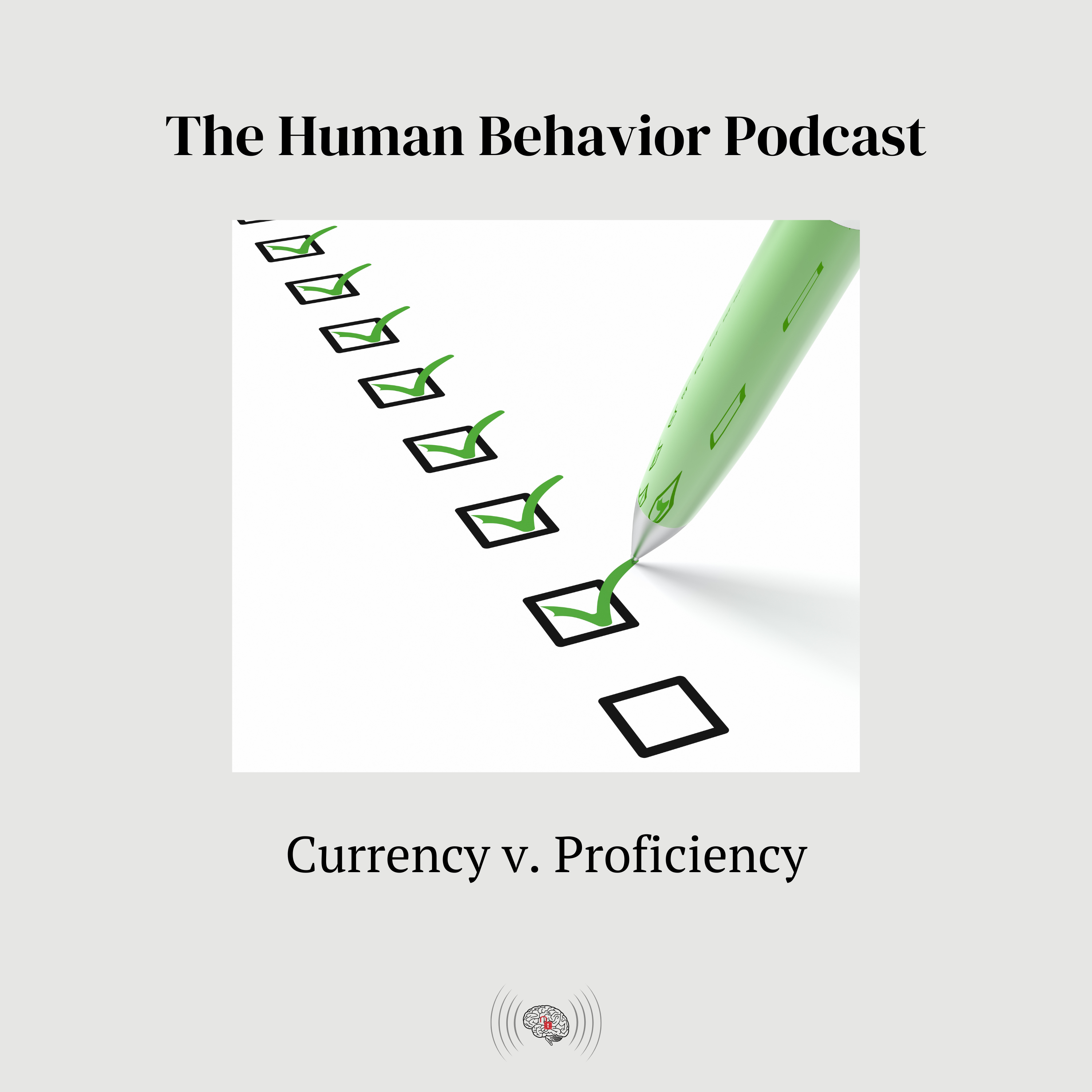In this week’s episode of the Human Behavior Podcast, we tackle the crucial distinction between being current and truly proficient in high-stakes professions. Titled “Currency v. Proficiency,” this episode delves deep into why passing a test or maintaining certification is not enough to ensure true skill mastery.
The conversation begins with an exploration of the aviation industry, renowned for its meticulous training standards. Pilots not only maintain certifications but also undergo rigorous training to ensure true proficiency. The episode draws fascinating analogies between aviation’s safety checklists and other professions, emphasizing that meeting minimum standards doesn’t equate to true expertise. For example, while Disney uses captivating entertainment methods to engage audiences, pilots rely on detailed safety checklists to ensure passenger safety. This contrast highlights the importance of proficiency in ensuring effectiveness and safety in high-stakes scenarios.
https://www.aopa.org/training-and-safety/active-pilots/safety-and-technique/currency-vs-proficiency
Personal anecdotes enrich the discussion, including experiences with the Civil Air Patrol and a rich family aviation history. These stories illustrate how early exposure to rigorous training standards can shape one’s career and interests. The hosts argue that true proficiency comes from being challenged and pushed outside comfort zones, rather than simply meeting certification requirements.
The episode also tackles the concept of currency versus proficiency within the context of aviation and other high-stakes professions. Being current means meeting the FAA’s requirements to act as a pilot in command, but it doesn’t necessarily imply proficiency. Proficiency signifies full competence, often implying having met some currency requirements but going beyond them. The conversation emphasizes that educational and training systems often focus on minimum standards rather than true expertise. For instance, passing a test might indicate currency, but true proficiency involves cognitive performance and situational awareness.
In law enforcement, the episode explores the contrast between perceived and actual training proficiency. Using Disney theme parks as an analogy, the hosts discuss how theme parks focus on exciting attractions to capture attention, while law enforcement training often falls short of public expectations, relying on minimal standards and sporadic proficiency checks. The conversation highlights the need for a paradigm shift towards a more rigorous and systematic approach akin to the aviation industry’s use of checklists.
The episode also addresses effective training strategies for proficiency. Simplifying complex topics and using tools like checklists are emphasized as powerful methods. The parallels between aviation safety protocols and other high-stakes professions, such as law enforcement and emergency services, are explored. The hosts challenge the notion that oversimplification undermines complexity, advocating instead for clear, actionable guidance grounded in science and facts. They stress the value of proficiency over sheer quantity of practice, emphasizing the need for varied, high-quality training scenarios to better prepare for unpredictable real-world situations.
The conversation then shifts to the distinctions between currency and proficiency. Currency is driven by policy and societal norms, while proficiency is honed through knowledge, skill acquisition, and experience. Current systems often prioritize check-the-box training and maintaining currency over truly developing proficiency. Real-life examples, like educational requirements and routine compliance tasks, illustrate the potential pitfalls of such an approach. The hosts emphasize the importance of practical, situational training, stressing that proficiency comes from understanding and applying concepts in various contexts, leading to better problem-solving skills.
The episode also explores the critical importance of examining all contributing factors to incidents rather than focusing solely on the immediate cause. The dangers of knee-jerk reactions and the cyclical nature of public opinion are highlighted, using examples from law enforcement and the education system. The conversation draws parallels with thorough investigative processes in aviation accidents, emphasizing how every detail is scrutinized to understand the broader context. The unique case of the Oxford school shooting, where the parents were prosecuted for involuntary manslaughter, illustrates how understanding the full spectrum of contributing factors can lead to unprecedented legal actions.
The complexities of decision-making and the broader implications of effective training strategies are also discussed. The episode explores persistent issues such as immigration and the need for a comprehensive approach to problem-solving. Unchanged policies since the 1990s have led to the current immigration crisis, emphasizing the importance of considering factors like drug demand and international relationships. Parallels are drawn to the military’s frequent updates on uniforms and sidearms, questioning their actual impact. The necessity of focusing on outcomes rather than just implementing changes for the sake of it is stressed. By learning from past incidents and applying those lessons broadly, systemic issues in various sectors, from aviation safety to homelessness and law enforcement, can be better addressed.
Finally, the episode emphasizes the importance of defining outcomes and working backward to inform policies, tactics, and procedures in various industries, especially in law enforcement and aviation. A clear understanding of the intended results can transform resource allocation, training, and processes. Comparing the comprehensive investigative approaches of the FAA and NTSB in aviation with current methods in law enforcement highlights the need for systemic recommendations for the entire industry.

Comments are closed